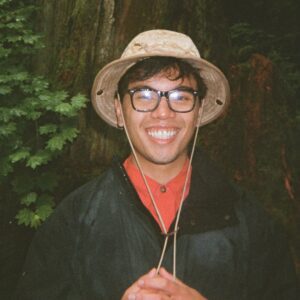What inspired you to start your career at The Tyee?
I first met David Beers, the founder of The Tyee when he was the editor of the Mix section in the Vancouver Sun in 1998 or so. I started to do a lot of writing for the Sun, and it was always a great pleasure to work with Dave, even though he never answered his damn phone!
When Dave left the Sun to start The Tyee, he called me up and said, “Let’s have lunch.” So, we met at a tiny little sushi place on Seymour Street, and he told me he was starting up an online magazine and asked if I was interested in doing some writing. At the time (circa 2003) online publications were still relatively new. Salon was around and Gawker, but there wasn’t really much in Vancouver.
I immediately said that I wanted to write about film and my first review as the Tyee’s film critic was published on May 5, 2004. So, 18 years ago. I wrote a weekly column about film, as well as personal essays and other things for the first 10-15 years, while I was working at the Vancouver International Film Festival (VIFF) and at DOXA Documentary Film Festival.
When I was getting ready to step down from my position as Director of Programming at DOXA, the idea of taking on the role of Culture Editor at The Tyee just kind of organically came up. It’s been a true joy to expand my purview to more than just film, covering the literary arts, the visual art world and the performing arts, and even doing some illustration for different stories.
What was your first media/journalism job?
I did my first degree in English at SFU, and my second degree at Emily Carr. Not long after I graduated from Emily Carr, a friend of mine, who was the books editor at The Loop Magazine in Vancouver, asked me if I wanted to do any writing. Her logic being that because I had an English degree, I could probably write. From there, I started to do a lot of freelancing, writing for all kinds of different publications across Canada and the U.S. and even some international magazines.
One of the most interesting of these early experiences was doing some food writing for a magazine that was based in Japan called EAT. It was a big glossy publication, but they took a pretty eclectic approach to the subject of food and would do theme issues devoted to different ideas. The one I most remember was the issue dedicated to the idea of rot. Many different kinds of edible stuff have to undergo some form of rot in order to become tasty (think wine, cheese, etc.)
Getting to write about many different things, food, fashion, film, was a good way to figure out what I was really interested in doing. It also gave me a chance to work with many editors, which is also really useful in developing your skills as a writer. It can also be incredibly humbling, but I think that’s actually a good thing.
What has been the biggest challenge you have had to overcome?
I think because I didn’t come from a journalism background, I had to learn a lot of things the hard way, essentially by trying and failing. Nothing teaches you harder or faster than really falling on your face in a public way.
If you were not in the media – what industry would you work in?
I worked for many years in the arts, specifically film festivals (DOXA and VIFF) and I still miss aspects of that world, although I do not miss the constant anxiety of event production. I still have nightmares about film formats gone wrong, and filmmakers missing their flights.
The one thing that event production teaches you is that anything that can go wrong will probably go wrong, no matter how hard you work to prevent it. It’s a deeply imperfect world. But that being said, the highs of festival production are pretty amazing when everything comes together the way it should.
What has been a highlight of your career?
I have had a lot of really wonderful experiences, both working in the arts and in media. One of the greatest was our opening night at DOXA in 2014 with the film Virunga.
We were the first festival to program the film. I had screened it many months earlier when it was still quite rough, but even then it was clear that it was an extraordinary story. The film went on to win the Academy Award for Best Documentary that year. We were able to bring the filmmaker and one of the rangers who worked with the mountain gorillas in the Virunga National Park, and the reaction from the audience was simply overwhelming. People were on their feet, crying and applauding. I was very proud and happy to be part of that moment.
I guess my other proudest moment was winning the Max Wyman Award for Critical Writing in 2020. It was a total surprise to win that award and I was really quite moved by it, given what Max Wyman has done for cultural criticism in Canada.
What are your predictions for the future of the media industry?
It’s an interesting time to be in the media world, as things really do seem to be shifting quite dramatically. The success of independent media publications, like The Tyee, the Narwhal and others are really changing people’s perceptions of what the media can and should do. As a reader funded media outlet, The Tyee has a level of independence that really allows it to go deep and hard on the most pressing issues. It’s actually a really exciting time to be working in the media. I don’t think clear and in-depth reporting has ever been more necessary.
What are 2 tips you want to pass along to PR professionals that send you pitches?
Be patient! Simply getting through daily email takes a significant amount of time.
Be concise! A really long press release doesn’t do anyone any favours. Keep it short and to the point.
Categories:
Ask the Expert
Tags:
Media publications, The Tyee



